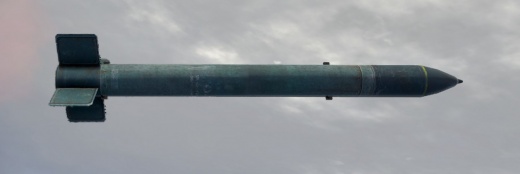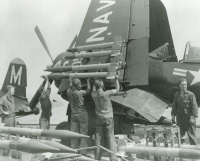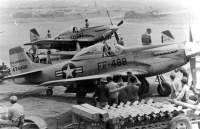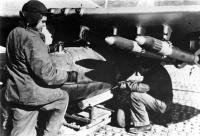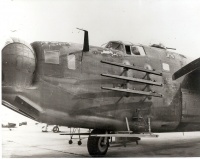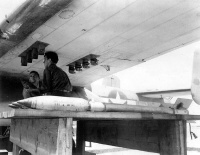Difference between revisions of "HVAR"
(Edits.) |
m (Added images.) |
||
| Line 28: | Line 28: | ||
== Description == | == Description == | ||
<!--''Write an introduction to the article in 2-3 small paragraphs. Briefly tell us about the history of the development and combat using the weaponry and also about its features. Compile a list of air, ground, or naval vehicles that feature this weapon system in the game.''--> | <!--''Write an introduction to the article in 2-3 small paragraphs. Briefly tell us about the history of the development and combat using the weaponry and also about its features. Compile a list of air, ground, or naval vehicles that feature this weapon system in the game.''--> | ||
| + | [[File:HVAR_sideview_WT.jpg|520px|thumb|left|Side view of an '''{{PAGENAME}}''' unguided rocket.]] | ||
| + | {{break}} | ||
The '''{{PAGENAME}}''' ('''H'''igh-'''V'''elocity '''A'''ircraft '''R'''ocket) was developed to be an American unguided rocket utilized for attacking ground targets from aircraft. This rocket began production towards the end of World War II and saw action through the Korean War. The HVAR was developed as an improvement upon the 5-inch Forward Firing Aircraft Rocket (FFAR) which had the same size warhead, however, it also sported an underwhelming 3.25 in (8.3 cm) rocket motor. The rocket was a good size; however, adaptations were needed to make it a faster rocket especially in a flatter trajectory, being fired from an external mount on an aircraft. Increasing the rocket motor’s size allowed for the rocket to take on the 5 in diameter throughout the entire length of the rocket thereby increasing the propellant capacity from 8.5 lb to 23.9 lb. This rocket was outfitted with Ballistite for the propellant which had a greater specific impulse greater than the British, German or Soviet versions of rocket propellant. The ∆V (Delta 'Vee') for the new HVAR increased from 216 m/s to 420 m/s (1,400 ft/s), more than enough to provide the flat trajectory the designers and the military wanted. | The '''{{PAGENAME}}''' ('''H'''igh-'''V'''elocity '''A'''ircraft '''R'''ocket) was developed to be an American unguided rocket utilized for attacking ground targets from aircraft. This rocket began production towards the end of World War II and saw action through the Korean War. The HVAR was developed as an improvement upon the 5-inch Forward Firing Aircraft Rocket (FFAR) which had the same size warhead, however, it also sported an underwhelming 3.25 in (8.3 cm) rocket motor. The rocket was a good size; however, adaptations were needed to make it a faster rocket especially in a flatter trajectory, being fired from an external mount on an aircraft. Increasing the rocket motor’s size allowed for the rocket to take on the 5 in diameter throughout the entire length of the rocket thereby increasing the propellant capacity from 8.5 lb to 23.9 lb. This rocket was outfitted with Ballistite for the propellant which had a greater specific impulse greater than the British, German or Soviet versions of rocket propellant. The ∆V (Delta 'Vee') for the new HVAR increased from 216 m/s to 420 m/s (1,400 ft/s), more than enough to provide the flat trajectory the designers and the military wanted. | ||
| Line 77: | Line 79: | ||
=== Pros and cons === | === Pros and cons === | ||
''Summarize and briefly evaluate the weaponry in terms of its characteristics and combat effectiveness. Mark pros and cons as a list.'' | ''Summarize and briefly evaluate the weaponry in terms of its characteristics and combat effectiveness. Mark pros and cons as a list.'' | ||
| + | [[File:B-25_HVAR_hit.png|400px|thumb|right|A [[B-25 (Family)|B-25]] about to be hit by an HVAR unguided missile.]] | ||
'''Pros:''' | '''Pros:''' | ||
Revision as of 03:05, 6 May 2019
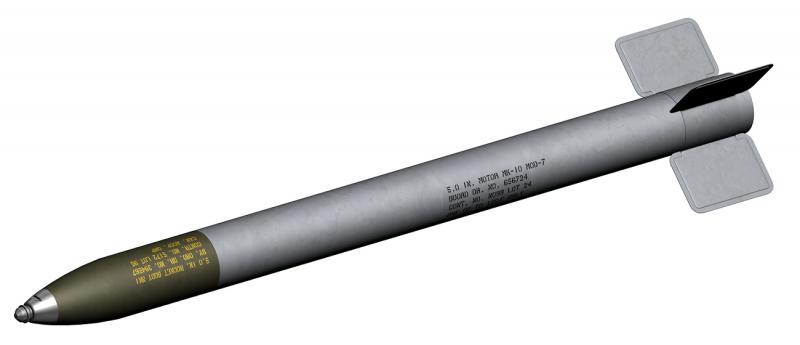
Contents
Description
The HVAR (High-Velocity Aircraft Rocket) was developed to be an American unguided rocket utilized for attacking ground targets from aircraft. This rocket began production towards the end of World War II and saw action through the Korean War. The HVAR was developed as an improvement upon the 5-inch Forward Firing Aircraft Rocket (FFAR) which had the same size warhead, however, it also sported an underwhelming 3.25 in (8.3 cm) rocket motor. The rocket was a good size; however, adaptations were needed to make it a faster rocket especially in a flatter trajectory, being fired from an external mount on an aircraft. Increasing the rocket motor’s size allowed for the rocket to take on the 5 in diameter throughout the entire length of the rocket thereby increasing the propellant capacity from 8.5 lb to 23.9 lb. This rocket was outfitted with Ballistite for the propellant which had a greater specific impulse greater than the British, German or Soviet versions of rocket propellant. The ∆V (Delta 'Vee') for the new HVAR increased from 216 m/s to 420 m/s (1,400 ft/s), more than enough to provide the flat trajectory the designers and the military wanted.
The 5 in HVAR rocket was able to pack a punch and in doing so could penetrate 4 ft of reinforced concrete and be effectively used against sinking transport ships, destroying pillboxes, ammunition dumps, tanks and railroad locomotives. It was demonstrated that pilots inexperienced with the HVAR had decreased chances of hitting their target whereas experienced pilots could utilize them with deadly and almost pinpoint accuracy. Often HVAR and Tiny Tim rockets were used together with F-84 jets loading out up to 24 HVAR rockets and two Tiny Tims for an astounding rocket weight of 5,800 lb (2,600 kg).
Vehicles equipped with this weapon
| Vehicles equipped with this weapon | |
|---|---|
| Fighters | |
| F4U | F4U-1D · F4U-4 · F4U-4B · F4U-4B VMF-214 · F4U-7 |
| F6F | F6F-5 · ▄F6F-5 · F6F-5N · ▄F6F-5N · ▄Hellcat Mk II |
| F8F | F8F-1 · F8F-1B · ▄F8F-1B |
| P-47 | P-47D-25 · P-47D-28 · P-47M-1-RE · ⋠P-47M-1-RE · P-47N-15 |
| P-51 | P-51D-5 · P-51D-10 · P-51D-20-NA · P-51D-30 · P-51H-5-NA |
| Twin-engine fighters | F-82E · F7F-3 · P-38L-5-LO |
| Jet fighters | |
| F-80 | F-80A-5 · F-80C-10 |
| F-84 | F-84B-26 · F-84G-21-RE · ▄F-84G-21-RE · ▄F-84G-26-RE |
| F-86 | ◄CL-13A Mk 5 · ◄CL-13B Mk.6 · F-86A-5 · F-86F-2 · F-86F-25 · F-86F-30 ▅ · F-86F-35 · F-86F-40 ▅ · F-86F-40 JASDF▅ |
| F2H | F2H-2 |
| F9F | F9F-2 · F9F-5 |
| Meteor | Meteor F Mk 8 G.41K |
| Attackers | A-26B-50 · AD-2 · AD-4 · ▄AD-4 |
| Bombers | A-26C-45DT · M.B.175T · PV-2D · SB2C-4 · ▄SB2C-5 |
| Jet bombers | B-57B |
| Helicopters | ▄H-34 |
General info
Tell us about the tactical and technical characteristics of the bomb.
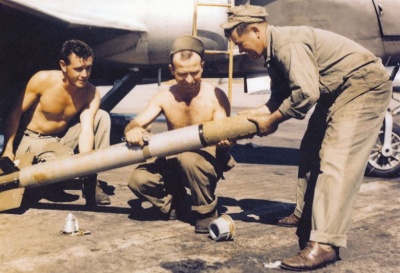
Effective damage
- Targets
- Smaller ships
- Anti-aircraft artillery
- Pillboxes
- Light to medium armoured tanks
- Locomotives
- Bunkers
Comparison with analogues
Give a comparative description of bombs that have firepower equal to these type of weapons.
Usage in battles
The HVAR rocket has an effective punch for a 5 in. rocket. This rocket can be utilised against hardened targets such as pillboxes, anti-aircraft artillery and light to medium tanks with positive results. Rockets scoring a direct hit will blast through concrete and armour while nearby hits will also score splash damage. The HVAR can be a tricky rocket to get on target as it is unguided, once it is fired, it will continue to fly until it either hits the target, hits the ground nearby or runs out of fuel. Typically multiple HVAR rockets are fired off a the same time to ensure some contact with the target. While not as unpredictable as the 2.75 in. FFAR Mighty Mouse, it never hurts to fire off an extra rocket when available when attacking a target.
Pros and cons
Summarize and briefly evaluate the weaponry in terms of its characteristics and combat effectiveness. Mark pros and cons as a list.
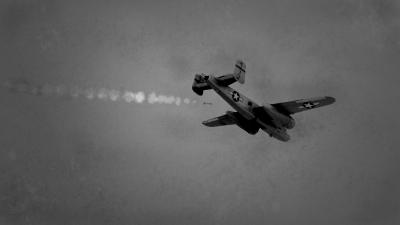
Pros:
- HVARs were rail launched, no drag from empty launchers as in the case of the M8's M-10 launch tubes
- Effectively used against semi-hardened and hardened ground targets
- Fitted to fighters, helicopters, attackers and some bombers
- Effective when used in conjunction with Tiny Tim rockets
Cons:
- Unguided, typically need to fire several to ensure the target is hit
- Difficult to use against moving vehicles unless at very low altitude
History
Examine the history of the creation and combat usage of this weapon. If the historical reference turns out to be too big, take it to a separate article, taking a link to an article about the vehicle and adding a block "/ History" (example: https://wiki.warthunder.com/(weapon-name)/History) and add a link to it here using the main template. Be sure to reference text and sources by using <ref>, as well as adding them at the end of the article.
Media
See also
Links to the articles on the War Thunder Wiki that you think will be useful for the reader, for example:
- reference to the article about the variant of the weapon;
- references to approximate analogues by other nations and research trees.
External links
Paste links to sources and external resources, such as:
- topic on the official game forum;
- encyclopedia page on the weapon;
- other literature.


